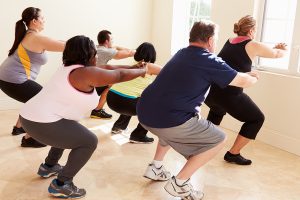We know that stress can age you prematurely, but what do we need to do to prevent unhealthy aging? This is exactly what this review by cardiologist Dr. Joel Kahn has done. It points out that the right lifestyle makes the difference.
Studies showing how to prevent unhealthy aging
Several studies have shown how to avoid getting heart disease, cancer and diabetes.
2001 Harvard lifestyle study
Kahn reported that in 2001 the Harvard School of Public Health published a study where 84,941 healthy female nurses had been followed who were free of heart disease, cancer and diabetes at baseline. But only 3.4% of the 84,941 women managed to stay healthy after 16 years of the study. The secret? Their body mass index (BMI) was less than 25.0, their diet was high in polyunsaturated fat and fiber, low in trans fat and low in glycemic load, they engaged in regular moderate exercise with a minimum of 30 minutes per day; they did not smoke and they drank ½ an alcoholic drink per day. Their risk to get diabetes was 91% lower than the rest of the study. This shows you how powerful lifestyle choices are; it shows us how to prevent unhealthy aging.
INTERHEART study
In 2004 an international study (the INTERHEART study) reported in the Lancet the lifestyle of 15,152 cases that developed heart attacks in 52 countries with 14,820 controls who did not have heart attacks. The researchers found 9 risk factors that accounted for 90 to 95% of the heart attacks. They were smoking, cholesterol risk ratio elevation, diabetes, high blood pressure, abdominal obesity, stress, low intake of fruit and vegetables, high alcohol intake and lack of physical exercise. Obesity counted as a risk factor when the waist circumference measured more than 35 inches in a woman or more than 40 inches in a man. Lifestyle changes could eliminate all these 9 risks.
2006 Health Professional Study
The 2006 Health Professional Study spanned over 16 years in a group of 40 to 75 year old doctors without a heart attack at baseline. It noted that male doctors who were lacking the 5 heart attack risk factors had 87% less heart attacks than controls without health lifestyles. What were the lifestyle factors? A body mass index (BMI) of less than 25, being a nonsmoker, being physically active for more than 30 minutes a day, having not more than moderate amounts of alcohol intake and having a diet that was more than 40% plant based.
2007 Swedish study
In 2007 a Swedish study reported on 24,000 women after menopause that had no heart attacks initially. After 6 years of follow-up 308 women developed heart attacks. An analysis showed what the risk factors were for those who developed heart attacks. Those who did not have these risk factors reduced their risk of getting a heart attack by 92%. What lifestyle factors were protective? Four factors were identified: a low-risk diet (consisting of high vegetable and high fruit intake, whole grains, legumes, fish and moderate alcohol intake), not smoking, walking or biking 40 minutes daily and a low waist circumference.
2008 Harvard study (follow-up to 2001 study)
In 2008 the Harvard University released a study that was a further follow-up of the Health Professional study with more than 43,000 men and also the Nurses’ Health Study with more than 71,000 women. The question here was what would prevent the development of strokes? The investigators found that in both groups stroke risk reduction by 50% was achievable with the following 5 lifestyle factors: no smoking, keep the BMI below 25, exercise at least 30 minutes daily with moderate activity, don’t exceed a modest alcohol intake and have a diet intake in the top 40% of fruit, vegetables and whole grains. This, too shows us how to prevent unhealthy aging.
2014 study from the Netherlands
A 14 yearlong study from the Netherlands was published in 2014, where almost 18,000 men and women without heart disease at the beginning of the study were followed. More than 600 heart attacks occurred throughout the study. People who stuck to 4 lifestyle habits reduced their heart attack rates by 67%; if they adhered to 5 lifestyle factors they reduced the heart attack rate by 83%. The 4 initial lifestyle factors were: doing an average of 30 minutes of physical activity per day, eating a Mediterranean style diet rich in fruit and vegetables and whole grains, not smoking and having more than one alcoholic drink per month. This gave you a reduced risk of your heart attack rate by 67%. Add one more good habit: sleep 7 or more hours per night on average. This reduces the risk of you getting a heart attack by 83%!
Swedish heart study (more than 20,000 men)
A Swedish heart study with initially more than 20,000 men was going on for 11 years. The investigators identified 5 lifestyle habits as essential to reduce heart attack rates. Unfortunately only 1% of the study group adopted all 5 lifestyle factors, but they dropped their chance of getting a heart attack or dying of a heart attack by 86%. The lifestyle factors were: a diet rich in fruit and vegetables, legumes, nuts, whole grains and low fat; not smoking, moderate alcohol consumption, thin waistline and more than 40 minutes of physical activity. All of this demonstrates to us how to prevent unhealthy aging.
Preserving health and vitality to prevent unhealthy aging
There is a clear pattern in all of these large studies. A healthy lifestyle preserves your health by keeping your joints and muscles in good working order. When you engage in cardiovascular training every day, your heart and lungs will work at their best capacity. This keeps your nitric oxide going, which is an important signalling molecule that in turn reduces your blood pressure.
When we remove disabling diseases like strokes and heart attacks and prevent diabetes from developing, life expectancy is increasing. There will be fewer disabilities and less frailty when people remain physically active even in old age. By adhering to good lifestyle habits even Alzheimer’s disease occurs less often.
Conclusion
The studies cited here show how lifestyle factors can make a significant difference in preventing heart attacks and strokes. In the past even doctors ignored the risk of smoking. A few years back conventional medicine negated that lifestyle factors could make a difference. Now we have more studies than we need to prove that this is so. It is more important that we adhere to as many of the lifestyle factors identified in these studies to make a real difference in our lives. We also need to set an example to the next generation and to our peers. Adopting healthy lifestyle factors has to become a cultural habit for society at large. This will help reduce healthcare costs, but most importantly this will help you and me to live longer, healthier lives. It will help us to prevent unhealthy aging.







